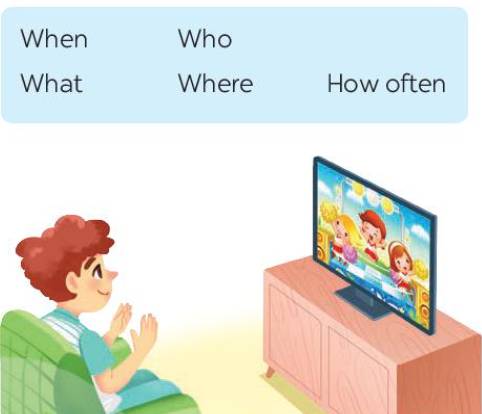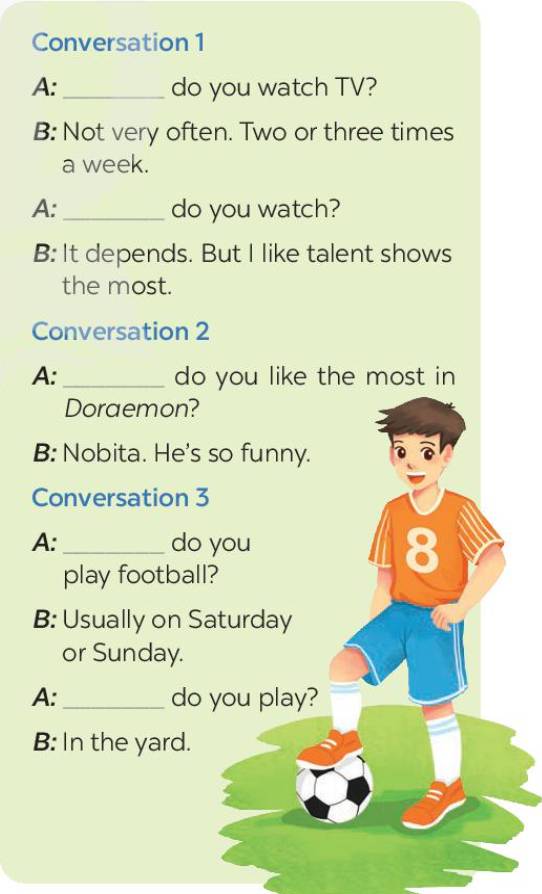Use the question words in the box to complete the conversations. Then listen and check your answer.


Hãy nhập câu hỏi của bạn vào đây, nếu là tài khoản VIP, bạn sẽ được ưu tiên trả lời.


Sounds like s in drinks (Âm s như trong drinks) | Sounds likes s in bananas (Âm s như trong bananas) | Sounds like s in glasses (Âm s như trong glasses) |
- chips - grapes - desserts - likes | - vegetables | - peaches - oranges - slices |

1-protein
2-carbohydrates
3-vitamins
4-diseases
5-minerals
6-fat
7-fat
8-water
Nutrients in food
There are six main types of nutrients.
(1) Protein makes you strong. There is a lot of this in meat, fish, milk, eggs, beans and nuts.
(2) Cabonhydrates give us energy. There are a lot of these in bread, pasta, rice and potatoes.
(3) vitamins are important nutrients in the food we eat and you can find them in different types of food. People who don't get many of these in their food can get (4) diseases.
(5) Minerals are important for strong teeth and bones. You can find them in meat, fish, milk, vegetables and nuts. This nutrient has got the most energy and is good for our skin and hair. The (6) fat in food such as butter, chocolate, chips, burgers and crisps is unhealthy, but the (7) fat in food like olive oil, nuts and some fish is healthy.
(8) Water is also a very important nutrient. You can't live for more than one or two days without it There's a lot of this in fruit, vegetables and juice, too.

Daisy: Hi, Neil. Is anything the (1) MATTER? You look really (2) UPSET.
Neil: I'm really concerned about the engineering course I’m doing. It’s too (3) DIFFICULT and I'm really not enjoying it. I know I’m not going to pass.
Daisy: Have you spoken to your teachers about it?
Neil: No. I'm so worried, I haven't told (4) ANYONE. What would you do if you were me?
Daisy: My advice is to get help now. If you don't, things will only get (5) WORSE.
Neil: I don’t know what to do. I think an apprenticeship would be better for me, but it’s too (6) LATE now.
Daisy: Don’t panic. It’s never too late, but you need to speak to someone about it.
Neil: You're (7) RIGHT . I'll go and talk to my teacher now. Thanks, Daisy.
Daisy: No problem.
Neil's problem: He is really concerned about the engineering course he's doing. It's too difficult.
Daisy's advice: Neil should get help and he should speake to his teacher.

1. mum
2. small
3. expensive
4. nice
5. cheaper
6. less
1
1: mum
2: small
3: expensive
4: nice
5: cheaper
6: less

1. surface
2. fossil
3. greenhouse
4. global
5. rain
6. climate
7. sea
8. ice
9. renewable
Hướng dẫn dịch:
SỰ NÓNG LÊN TOÀN CẦU
Hồ sơ dữ kiện
Trái đất đang nóng lên. Nhiệt độ bề mặt trung bình hiện nay cao hơn 0,75 ° C so với 100 năm trước.
Khi chúng ta đốt nhiên liệu hóa thạch, chúng thải ra khí nhà kính như carbon dioxide (CO2). Điều này gây ra hiện tượng ấm lên toàn cầu.
Chúng ta đã chặt phá hơn 50% rừng mưa trên Trái đất trong 60 năm qua. Những điều này rất quan trọng vì chúng loại bỏ CO2 khỏi khí quyển và bổ sung oxy. Chúng cũng là nơi sinh sống của hơn một nửa số loài động thực vật trên thế giới.
Một số nhà khoa học tin rằng đến năm 2050, khoảng 35% các loài động thực vật có thể chết vì biến đổi khí hậu.
Mực nước biển đang dâng cao và các chỏm băng ở hai cực đang tan chảy.
Các nhà khoa học nói rằng nhiên liệu hóa thạch như than và khí đốt có thể cạn kiệt vào năm 3000. Vì vậy, chúng ta cần phát triển các giải pháp thay thế, chẳng hạn như năng lượng tái tạo và năng lượng hạt nhân.
Conversation 1
(Bài đối thoại 1)
A: How often do you watch TV?
(Bạn xem TV bao lâu một lần?)
B: Not very often. Two or three times a week.
(Không thường xuyên lắm. Hai hoặc ba lần một tuần.)
A: What do you watch?
(Bạn xem gì?)
B: It depends. But I like talent shows the most.
(Còn tùy. Nhưng mình thích chương trình tìm kiếm tài năng nhất.)
Conversation 2
(Bài đối thoại 2)
A: Who do you like the most in Doraemon?
(Bạn thích ai nhất trong Doraemon?)
B: Nobita. He's so funny.
(Nobita. Bạn ấy thật hài hước.)